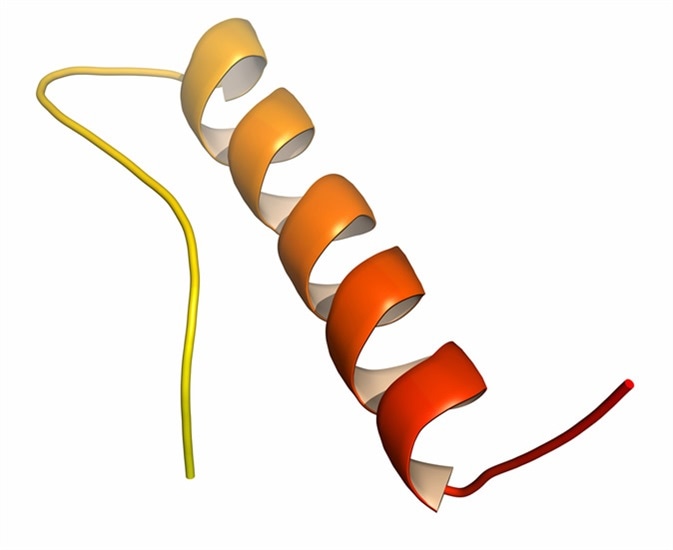Many hormones that are important to energy homeostasis have been found to be secreted by the gastrointestinal tract, which is thus the largest endocrine organ in the body. These hormones regulate food intake and energy expenditure, and have been studied extensively in the context of treating obesity.
Among these is peptide YY (PYY), a 36 amino acid peptide, which is synthesized in the L cells (intestinal endocrine cells) of the distal part of the ileum, colon and rectum. Its release occurs predominantly following feeding. PYY is rich in tyrosine residues, at both the carboxyl- and amino-ends of the molecule.

Peptide YY (PYY) appetite reducing polypeptide - Image Credit: Molekuul_be / Shutterstock
Factors Influencing PYY levels
PYY secretion is influenced by eating. Its levels are lowest in the fasting state and rise rapidly, in 15 minutes or less after a meal, to reach a plateau within an hour or two. It remains high for several hours. The number of calories, the meal composition, and food type all play a part in the neurohormonal secretion of PYY.
PYY administered directly into the brain binds to various Y receptors, and shows an anorexigenic or appetite-stimulating effect, depending on which part of the brain is stimulated. This indicates that its actions are heavily dependent on the Y-receptor subtype that it binds to.
Effects on the Human Body
PYY is anorexigenic and inhibits feeding stimuli after a meal, thus preventing excessive energy intake. This hormone is a strong stimulator of absorption in the small intestine, and its levels are reduced in obesity, which may contribute to the weight gain.
PYY also affects fuel allocation and bone metabolism in addition to food intake and body mass. It may be responsible for the significant bone loss that accompanies severe weight loss, while high levels of PYY can be observed in anorexia or after bariatric surgery. Its general importance in keeping bone mass steady cannot be underestimated.
Mechanism of Action
PYY is a pancreatic polypeptide hormone, along with pancreatic polypeptide (PP) and neuropeptide Y (NPY). These act through the Y receptor family - namely, Y1, Y2, Y4 and Y5. PYY has two forms in the body; one being PYY(1-36) and the other PYY(3-36). The former binds to Y1, Y2 and Y5. The latter activates Y2R, which are richly found in the NPY-secreting neurons of the arcuate nucleus of the hypothalamus, known to be closely involved in appetite regulation, and is exposed to nutrients and hormones from peripheral blood.
Thus peripheral calorie intake may stimulate PYY secretion, which in turn signals brain circuits to turn off the hunger feelings, thus stopping food ingestion. This peptide also modulates reward circuits in the brainstem, hypothalamus and other involved brain areas.
Impaired secretion of PYY may increase the risk of developing obesity or hinder weight loss by reducing satiety feelings and encouraging hyperphagia (i.e. excessive eating). Instead, PYY seems to be responsible for the loss of appetite and weight loss following some types of bariatric surgery.
Therapeutic Uses
Research shows that many hormones must act together to regulate energy intake. When the amount of food ingested drops, or the fat content goes down, the body automatically responds by compensatory secretion of adiposogenic hormones to limit further weight loss.
Unfortunately, this rules out the effective use of single anorectic agents when treating obesity. Instead, PYY with other Y2 agonists and appetite-regulating agents has a better chance of producing continuing weight loss via several different receptors.
References
Further Reading
Last Updated: Dec 29, 2022